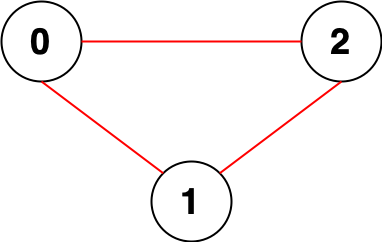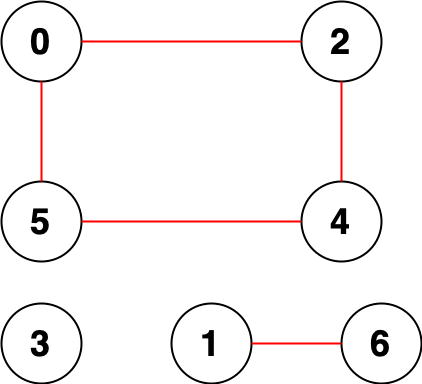You are given an integer n. There is an undirected graph with n nodes, numbered from 0 to n - 1. You are given a 2D integer array edges where edges[i] = [ai, bi] denotes that there exists an undirected edge connecting nodes ai and bi.
Return the number of pairs of different nodes that are unreachable from each other.
Example 1:
Input: n = 3, edges = [[0,1],[0,2],[1,2]] Output: 0 Explanation: There are no pairs of nodes that are unreachable from each other. Therefore, we return 0.
Example 2:
Input: n = 7, edges = [[0,2],[0,5],[2,4],[1,6],[5,4]] Output: 14 Explanation: There are 14 pairs of nodes that are unreachable from each other: [[0,1],[0,3],[0,6],[1,2],[1,3],[1,4],[1,5],[2,3],[2,6],[3,4],[3,5],[3,6],[4,6],[5,6]]. Therefore, we return 14.
Constraints:
1 <= n <= 1050 <= edges.length <= 2 * 105edges[i].length == 20 <= ai, bi < nai != bi- There are no repeated edges.
class Solution:
def countPairs(self, n: int, edges: List[List[int]]) -> int:
def dfs(i):
vis.add(i)
cnt = 1
for j in g[i]:
if j not in vis:
cnt += dfs(j)
return cnt
g = defaultdict(list)
for a, b in edges:
g[a].append(b)
g[b].append(a)
vis = set()
ans = s = 0
for i in range(n):
if i not in vis:
t = dfs(i)
ans += s * t
s += t
return ansclass Solution {
private boolean[] vis;
private List<Integer>[] g;
public long countPairs(int n, int[][] edges) {
vis = new boolean[n];
g = new List[n];
Arrays.setAll(g, k -> new ArrayList<>());
for (var e : edges) {
int a = e[0], b = e[1];
g[a].add(b);
g[b].add(a);
}
long ans = 0, s = 0;
for (int i = 0; i < n; ++i) {
if (!vis[i]) {
long t = dfs(i);
ans += s * t;
s += t;
}
}
return ans;
}
private int dfs(int i) {
vis[i] = true;
int cnt = 1;
for (int j : g[i]) {
if (!vis[j]) {
cnt += dfs(j);
}
}
return cnt;
}
}class Solution {
public:
long long countPairs(int n, vector<vector<int>>& edges) {
vector<vector<int>> g(n);
for (auto& e : edges) {
int a = e[0], b = e[1];
g[a].emplace_back(b);
g[b].emplace_back(a);
}
vector<bool> vis(n);
function<int(int)> dfs = [&](int i) -> int {
vis[i] = true;
int cnt = 1;
for (int j : g[i]) {
if (!vis[j]) {
cnt += dfs(j);
}
}
return cnt;
};
long long ans = 0, s = 0;
for (int i = 0; i < n; ++i) {
if (!vis[i]) {
long long t = dfs(i);
ans += s * t;
s += t;
}
}
return ans;
}
};func countPairs(n int, edges [][]int) (ans int64) {
g := make([][]int, n)
for _, e := range edges {
a, b := e[0], e[1]
g[a] = append(g[a], b)
g[b] = append(g[b], a)
}
vis := make([]bool, n)
var dfs func(int) int
dfs = func(i int) int {
vis[i] = true
cnt := 1
for _, j := range g[i] {
if !vis[j] {
cnt += dfs(j)
}
}
return cnt
}
var s int64
for i := 0; i < n; i++ {
if !vis[i] {
t := int64(dfs(i))
ans += s * t
s += t
}
}
return
}function countPairs(n: number, edges: number[][]): number {
const g = Array.from({ length: n }, () => []);
for (const [a, b] of edges) {
g[a].push(b);
g[b].push(a);
}
const vis = new Array(n).fill(false);
const dfs = (i: number) => {
vis[i] = true;
let cnt = 1;
for (const j of g[i]) {
if (!vis[j]) {
cnt += dfs(j);
}
}
return cnt;
};
let ans = 0;
let s = 0;
for (let i = 0; i < n; ++i) {
if (!vis[i]) {
const t = dfs(i);
ans += s * t;
s += t;
}
}
return ans;
}

